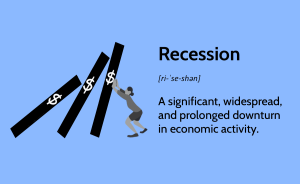
A recession is a significant and widespread decline in economic activity that lasts for a sustained period, typically measured by a decline in Gross Domestic Product (GDP) for at least two consecutive quarters.
Decline in Consumer Spending: Consumer spending is a crucial component of economic activity, and during a recession, there is typically a decline in consumer spending. This may be due to a variety of factors, including higher unemployment, reduced confidence in the economy, and decreased disposable income.
Increase in Unemployment: As businesses struggle to maintain profitability during a recession, they may lay off workers, leading to a rise in unemployment. This, in turn, can lead to a further decline in consumer spending, as those who are out of work may have less disposable income.
Decrease in Business Investment: During a recession, businesses may become more cautious about investing in new projects or expanding their operations. This can lead to a decline in business investment, which can further exacerbate the economic downturn.
Tightening of Credit: As lenders become more risk-averse during a recession, they may tighten their lending standards, making it more difficult for individuals and businesses to obtain credit. This can further reduce consumer spending and business investment.
Decline in International Trade: During a recession, there may be a decline in international trade as countries become more protectionist and consumers become more cautious about spending. This can lead to a decline in exports, which can further harm the economy.
Overall, a recession is a complex phenomenon that can have significant and far-reaching impacts on the economy and society as a whole. By understanding the key components that make up a recession, policymakers and business leaders can work to mitigate its effects and promote economic recovery.
A recession is a difficult time for any business. It can be challenging to navigate the economic downturn, maintain profitability, and keep your business afloat. However, by preparing your business for a recession, you can increase your chances of survival and emerge stronger on the other side. In this blog post, we will discuss some strategies for preparing your business for a recession, including how to assess your financial situation, reduce expenses, increase revenue, and manage your workforce.

Assessing your financial situation is the first step in preparing your business for a recession. Here are some tips for assessing your financial situation:
Reviewing your financial statements can help you identify areas of weakness and opportunities for improvement. Look for trends in revenue, expenses, and cash flow to identify areas of concern.
Analyzing your cash flow is essential for preparing your business for a recession. Identify your sources of cash inflow and outflow, and determine your net cash position. Look for ways to improve your cash flow, such as reducing expenses, increasing revenue, and managing your inventory more efficiently.
Assessing your debt load is crucial for preparing your business for a recession. Determine your debt-to-equity ratio and identify ways to reduce your debt load, such as refinancing or consolidating debt.

Reducing expenses is essential for preparing your business for a recession. Here are some tips for reducing expenses:
Cutting non-essential expenses is a quick way to reduce your expenses. Look for areas where you can cut costs, such as reducing travel, canceling subscriptions, and negotiating better rates with vendors.
Negotiating with suppliers can help you reduce your expenses and improve your cash flow. Look for opportunities to negotiate better prices, payment terms, and discounts.
Reducing payroll expenses can be a challenging but necessary step in preparing your business for a recession. Consider reducing hours, offering voluntary furloughs, or reducing salaries to maintain profitability.

Increasing revenue is essential for preparing your business for a recession. Here are some tips for increasing revenue:
Diversifying your product or service offering can help you increase revenue and maintain profitability during a recession. Look for opportunities to offer new products or services that are in high demand.
Expanding your customer base can help you increase revenue and maintain profitability during a recession. Look for opportunities to market your products or services to new demographics or geographic areas.
Increasing your marketing efforts can help you increase revenue and maintain profitability during a recession. Look for opportunities to increase your marketing budget and improve your marketing strategies.

Managing your workforce is essential for preparing your business for a recession. Here are some tips for managing your workforce:
Cross-training your employees can help you maintain productivity and reduce costs during a recession. Look for opportunities to cross-train employees in different areas of your business to ensure that you can maintain operations with a reduced workforce.
Consider alternative work arrangements, such as telecommuting or flexible schedules, to reduce payroll expenses and maintain productivity.
Communicating with your employees is essential for preparing your business for a recession. Be transparent about the state of your business, the steps you are taking to prepare for a recession, and the impact it may have on business as usual.
Copyright © 2024. All rights reserved. Crawford Business Consulting